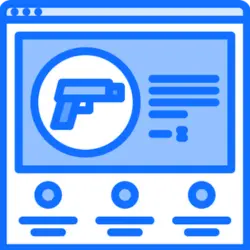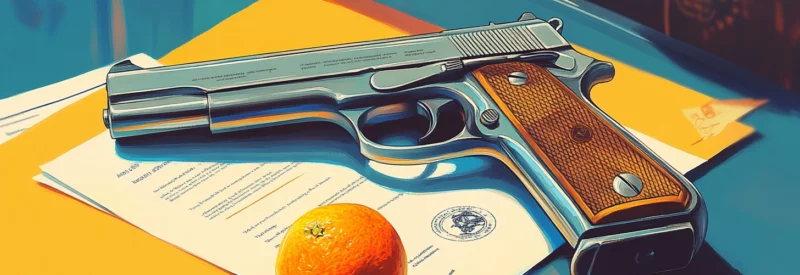If you want to start a firearms business, Florida is a great place to consider for its home base. In the state of Florida, any individual who wishes to engage in the firearms business must get a federal firearms license (FFL), just like in any other state. Beyond the federal requirements, however, the process is relatively straightforward. Florida is a gun-friendly state that has no state-regulated gun licensing, making it easier for new business owners to get an FFL. Let’s look at how to obtain an FFL in Florida in five easy steps.
Getting a Florida FFL: An Introduction

Let’s start with the basics. A Federal Firearms License (FFL) is a license in the United States that enables an individual or a company to engage in a business related to the manufacture or importation of firearms and ammunition, as well as the interstate and intrastate sale of firearms. The Bureau of Alcohol, Tobacco, Firearms, and Explosives (ATF) issues federal firearms licenses.
Beyond the direct buying and selling of firearms/ammunition, an FFL-authorized dealer is also required to facilitate the sale or transfer of a firearm between individuals if the individuals do not reside in the same state.
To get an FFL in Florida (or any state for that matter), you’ll need to apply to the ATF.[1]ATF. “Bureau of Alcohol, Tobacco, Firearms, and Explosives”. February 29th, 2024. In this article, we will look at Florida FFL requirements, the FFL license cost in Florida, and how to get an FFL in Florida.
Step 1: Meet All of the FFL Requirements
When starting a business in the firearms industry, you must meet all requirements before applying for your FFL. There are federal, state, and local/zoning requirements. Some requirements are standardized for all states, and some are unique to getting your Florida FFL.
Federal requirements
The federal requirements for getting an FFL are standardized across all 50 states. You’ll need to meet the following federal requirements to obtain an FFL in all states.
- Be at least 21 years old
- Be a citizen or legal permanent resident of the United States
- Not have a prior felony conviction
- Not be a user of federally illegal drugs (this includes marijuana because it’s a federally illegal drug, even though it’s legal at the state level)
- Have no prior conviction for domestic violence
- Have no prior conviction of any other offense that would disqualify you from owning a gun
- Not have a formal diagnosis as mentally incompetent
- Not have violated any federal gun laws
- Operate out of a physical location, either a home or storefront
- Meet the requirements for operating an FFL out of your chosen business location
If you’re eligible to purchase a gun, you are most likely eligible to get a license to sell them.
State requirements
Becoming an FFL dealer in Florida is easier than in most other states because Florida has no state-level licensing requirements. With that said, the ATF agent will require you to be familiar with the “Florida Department of Law Enforcement“, a 22-page guide outlining how to process and conduct FFL background checks. This requirement is because Florida is a “partial point of contact state.” This means the FBI does not conduct all background checks for FFLs. Instead, a state agency can take that process over.
Local and zoning requirements
Florida FFL requirements are much easier to navigate than most states because there are no state-level gun dealer licenses. Local requirements, however, may pose a point of contention. The main issue with local zoning requirements is that you, as a prospective business owner, must prove your business location suits the business purpose. While that sounds obvious, it can get a little messier for home-based FFLs, so check with your local regulators for more information.
Step 2: Select the Type of FFL You Need
Once you have worked out the Federal and state regulations, it’s time to figure out what type of FFL your business will need. There are nine options for FFLs.

The correct option for you will depend on your business model, the types of weapons/accessories you want to work with, and whether you want to deal, manufacture, or import firearms.
FFL license types
As we mentioned, you can choose from 9 types of FFL licenses. Depending on your business plans, you should first select whether you want to be a gun dealer, manufacturer, or importer. Below, we break down each type of Florida FFL within those three categories:
Dealer license types:
- 01 Type FFL: Dealer in firearms other than destructive devices
- 02 Type FFL: Pawnbroker in firearms other than destructive devices
- 09 Type FFL: Dealer in destructive devices
- 03 Type FFL: Collector of curios relics
Manufacturer license types:
- 06 Type FFL: Manufacturer of ammunition for firearms other than ammunition for destructive devices or armor-piercing ammunition
- 07 Type FFL: Manufacturer of firearms other than destructive devices
- 10 Type FFL: Manufacturer of destructive devices, ammunition for destructive devices, or armor-piercing ammunition
Importer license types:
- 08 Type FFL: Importer of firearms or ammunition for firearms other than destructive devices or ammunition other than armor-piercing ammunition
- 11 Type FFL: Importer of destructive devices, ammunition for destructive devices, or armor-piercing ammunition
Step 3: Complete an Online FFL Course
Although an online course is not a Florida FFL requirement, it is always a good idea. When starting a high-risk business, being well-versed in the rules and regulations both federally and at the local level is always best practice.
Step 4: Apply for Your Florida FFL
Once you have chosen the FFL you want and have met the federal and state regulations, it’s time to move forward with your application process.
To apply on the federal level, you’ll need:
- A completed application.
- Form 4473. The federal government uses this form to conduct a background check on any individual who wishes to purchase or sell firearms.
- Your fingerprints will be used to conduct a criminal background check.
- Your photographs will be used to create your FFL license.
Step 5: Have an Interview with a Representative from Your Regional ATF Office
After you’ve completed your application and passed the background checks, your regional ATF office in Florida will arrange an in-person interview with you. The Industry Operations Investigator (IOT) will meet with you to talk about your business, take a look at your proposed business location/home, and verify that you understand the federal laws around selling, importing, and/or manufacturing guns.[2]ATF. ”How to Become a Federal Firearms Licensee in 10 Easy Steps”. February 29, 2024
FFL License Costs in Florida
FFL License costs are the same for every state. Each license and renewal is valid for three years.
| FFL License | Application Fee | Renewal Fee |
| Type 01 | $200 | $90 |
| Type 02 | $200 | $90 |
| Type 03 | $30 | $30 |
| Type 06 | $30 | $30 |
| Type 07 | $150 | $150 |
| Type 08 | $150 | $150 |
| Type 09 | $3,000 | $3,000 |
| Type 10 | $3,000 | $3,000 |
| Type 11 | $3,000 | $3,000 |
Getting a Federal Firearms License in Florida: Closing Thoughts
Getting a federal firearms license in Florida benefits firearm businesses for many reasons. It makes it easier for gun owners to buy firearms from licensed dealers, and FFL holders can also purchase firearms at wholesale prices, saving buyers significant money. Finally, an FFL allows holders to conduct business online and ship firearms to customers in other states. Ultimately, an FFL can help to streamline the process of buying and selling firearms for gun owners. But, to sell firearms in the first place, you’ll need a firearm-friendly merchant account, also known as a high-risk merchant account. A high-risk merchant account will give you the security, support, and peace of mind you need to run your business successfully. With years of experience servicing firearm businesses, we offer customized and secure solutions to merchants normally turned away for credit card processing!
Tired of hearing “no”?
We help businesses that are normally turned away
Merchant Account today
Approval
Rating
FFL Florida FAQs
We hope you feel a bit more informed about what an FFL in Florida is and how it differs from other states. If you still have questions about getting an FFL in Florida, here are some of the most frequently asked questions.
Do I need an FFL in Florida?
Yes, you will need an FFL if you plan to have a business in the firearm industry and are engaged in the sales, manufacturing, or importing of firearms or ammunition in the state of Florida.
No, if you’re just looking to purchase a firearm.
Who can apply for an FFL in Florida?
Any legal US citizen or resident over the age of 21 with a clean background can apply for an FFL in Florida. However, you must first ensure you pass all federal and local business requirements outlined above.
Do I need to register as a business to get a Florida FFL?
Yes. Just like in all 50 states, you must register your business to get a Florida FFL.
How can I find an FFL dealer in Florida?
In Florida, there are several ways to find an FFL dealer. The most direct method is to contact a local gun shop or shooting range, as they will likely have FFL holders on staff. Another option is to consult the Bureau of Alcohol, Tobacco, Firearms and Explosives (ATF) website, which provides a searchable database of FFL dealers by state. Potential buyers can also check classified ads or online forums dedicated to firearms trading, as many private sellers will have an FFL to facilitate the transfer of guns. By finding a reputable FFL dealer, buyers can rest assured that their purchase will be conducted lawfully.
Can you have a home-based FFL in Florida?
Yes, you can have a home-based FFL in Florida. However, in Florida, according to local zoning regulations, you must prove you can conduct business within your home. This can make running an FFL business in a residential zone hard and is a common reason applications get denied.
Can I apply for an FFL with a Florida gun trust?
No. A gun trust is not a person or business, so you cannot apply for a Florida FFL through a gun trust.
Does the BATF&E have requirements for an FFL in Florida?
Yes, BATF&E has federal requirements for every state. The requirements are:
- As an FFL holder, you must keep strict and detailed records of all transactions. Each sale of a gun or firearms transfer in Florida must be recorded. The BATF&E may audit your paperwork.
- You also must be at least 21 years old.
- You must have a clean criminal history.
- Your business and the individual applicant must both adhere to the laws of the State of Florida and any applicable local or community laws and operate in a secure environment.
- You must be a legal resident of the United States.
- You must not have been dishonorably discharged if you have served in the armed forces.
- You must not have been a formally diagnosed psychological patient or a user of controlled substances.
Do I need to apply for a SOT for my Florida FFL?
Yes, depending on what type of business you start. According to the National Firearms Act, you will need to apply for an SOT with your FFL if your business involves any of the following weapons:
- Silencers
- Machine guns
- Short-barreled rifles
- Short-barreled shotguns
- Destructive devices (explosives)
How long does it take to get your FFL in Florida?
Once you have submitted all documents and an ATF agent has verified that you comply with all federal and state regulations, you should have FFL within 60 days of submission.
How can I transfer an FFL in Florida?
If you wish to sell your gun-based business in Florida, the buyer will need to apply for their own FFL and go through the process themselves. The FFL stays with the individual owner to whom they issued it. So, even if the owner dies or sells the business, the new owner must apply for their own FFL. This ensures the new business owner also meets all federal and state requirements.
How much does an FFL transfer cost in Florida?
Transferring a firearm through a licensed FFL dealer in Florida can cost anywhere from $20 to $200. The FFL transfer rates will vary depending on the individual FFL dealer you’ve chosen and the type of weapon/unique details of your sale.
How hard is it to get an FFL in Florida?
Compared to the other 49 states, it is relatively easy to get your FFL in Florida. The federal rules and regulations are the same across all states, but Florida has no additional state licensing, making it easier than many other states.




